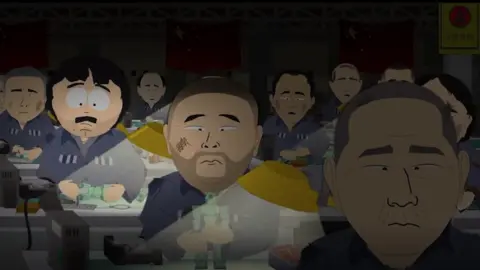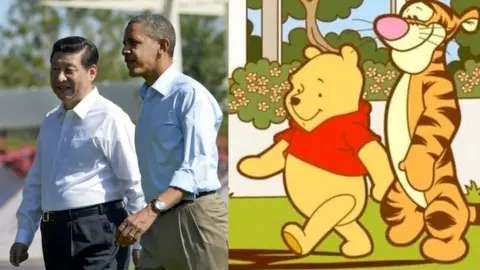South Park China: Writers in mock apology after Beijing censorship
 South Park / Comedy Central
South Park / Comedy CentralThe makers of US TV comedy South Park have issued a mock apology to China after the show was made largely unavailable in the country.
In a recent episode, the character Randy is subjected to forced labour and Communist Party re-education after being jailed during a visit to China.
Most South Park episodes and reviews are now unavailable online in China.
"We welcome the Chinese censors into our homes and hearts," the apology said. "Long live the Communist Party!"
What happens in the episode?
In "Band in China", Randy Marsh travels to China to try to expand his marijuana business.
He is arrested, sent to prison, and subjected to forced labour and re-education.
In one scene, Randy is seen standing in the rain while a guard gives him an electric shock.
"I am a proud member of the Communist Party," Randy then reads from a card. "The party is more important than the individual."
He then sees a guard shoot a prisoner in the head, before being sent to an overcrowded cell where he starts a conversation with Winnie the Pooh and Piglet.
In 2017, images of Winnie the Pooh were blocked in China because people compared him to the Chinese president, Xi Jinping.
"Some people said Pooh looked like the Chinese president, so we're illegal in China now," says Piglet.
"What kind of madhouse is this?" replies Randy.
 AFP/Weibo
AFP/WeiboWhat was the reaction in China?
Since the episode was shown in the US last week, searching for "South Park" on the Chinese social media site Weibo shows "no relevant results have been found".
The show has been removed from China's various video websites, including Bilibili, iQiyi, Youku and le.com. Although some searches show a brief introduction, they're not playable.
On Douban, a famous film review website in China, search results show that "according to relevant laws, regulations and policies, search results are not displayed".
On China's popular search engine Baidu, "South Park" still returns results - but most of the entries are old news. The top-ranked result criticises the show for its negative impact on teenagers.
Some people have got around the ban by using "S23E02" (Season 23, Episode 2) to discuss the show on Weibo.
How did South Park's makers respond?
On Twitter, the show's writers Trey Parker and Matt Stone issued an "official apology to China".
"Like the NBA [National Basketball Association], we welcome the Chinese censors into our homes and into our hearts," it said.
"We too love money more than freedom and democracy. Xi doesn't look just like Winnie the Pooh at all.
"Long live the Great Communist Party of China! May this autumn's sorghum [a cereal crop] harvest be bountiful! We good now China?"
The NBA reference follows US basketball coach Daryl Morey backtracking after tweeting support for the Hong Kong protesters.
Mr Morey's tweet led to his team, the Houston Rockets, having their games pulled from Chinese TV, as well as Chinese sponsors withdrawing support.
The NBA said Mr Morey's comments were "regrettable", while Rockets player James Harden said: "We apologise. We love China."
Mr Morey later said: "I have had a lot of opportunity since that tweet to hear and consider other perspectives."
How much does China censor?
Twitter and Facebook are not available to most users, Google is blocked, while in May, Wikipedia announced all versions of its site were also unavailable.
China's internet operates something like an intranet where only information deemed appropriate is freely available - often referred to as the Great Firewall of China.
Chinese newspapers and TV are under Communist Party control, while certain words and phrases are censored on Chinese social media.
Reports from the Hong Kong protests have been limited, while people can be banned for discussing sensitive issues.
"A friend of mine just got his WeChat [a Chinese messaging platform] account blocked for three days after he had a conversation with his friend talking about China's legal system, and reform of the legal system," Chinese journalist Karoline Kan told the BBC in September.
